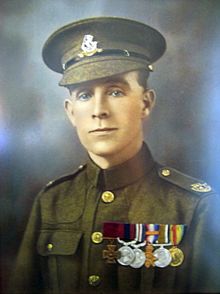 On September 28, 1918, outside of the French village of Marcoing, British Private Henry Tandley of the 5th Duke of Wellington Regiment came across an escaping wounded German soldier. The encounter took place near the end of the British capture of the village, and thus the military situation, though winding down, was still very much rife with hostilities. The soldier was presumably armed and posed a potential threat to Private Tandley and his fellow infantrymen.
On September 28, 1918, outside of the French village of Marcoing, British Private Henry Tandley of the 5th Duke of Wellington Regiment came across an escaping wounded German soldier. The encounter took place near the end of the British capture of the village, and thus the military situation, though winding down, was still very much rife with hostilities. The soldier was presumably armed and posed a potential threat to Private Tandley and his fellow infantrymen.
Private Tandley was presented at that moment with a serious ethical question: shoot preemptively in self-defense, not knowing the capability of the German soldier or the extent to which other German soldiers were present, or spare the soldier’s life and let him return to his unit, either to survive or to die in the arms of his own comrades. Private Tandley did not then know that an armistice with Germany would come within a matter of weeks, nor did he know whether the soldier had a wife and children to whom he might return after the war. He knew nothing of this German soldier other than that he was another human being who was injured.
Private Tandley decided to spare the soldier’s life, and the soldier continued on his way, apparently nodding to Tandley in appreciation.
This story is presented in here because, if Tandley’s account is correct, his decision to spare the life of this German soldier changed the course of the 20th century, with vast consequences not only for the law but also for every other aspect of culture and society across much of the world.
According to Tandley, the German soldier was Corporal Adolf Hitler, whose subsequent rise to power in post-war Germany, efforts to occupy much of Europe, North Africa, and Russia, and monstrous program to exterminate Jews and others led not only to the deaths of tens of millions of human beings but ultimately to unprecedented international legal developments, including most immediately the Nuremberg war crimes trials and the occupied reconstruction of post-war Germany and Japan.
Moral decision making—including the ethical choices of attorneys—often must proceed in the absence of complete information, whether of present circumstances or, of course, of future events. It is entirely defensible to conclude that Private Tandley made the right moral choice on September 28, 1918, despite the consequences that were to follow. Intervening decisions by many other people subsequent to that date led to Hitler’s ascendancy, and no one really knows what the 1930s and 1940s, let alone later decades, would have looked like even in the absence of Hitler.
Tandley, it turns out, was no ordinary front-line soldier. Upon the conclusion of World War I, he was in fact Britain’s most highly decorated private of the war. After he died in 1977, his ashes, per his instructions, were scattered in the British Cemetery in Marcoing, France – the same locale where he once spared the life of an unknown German soldier.

September 28, 1918, was also the day that U.S. Corporal Freddie Stowers was killed by German troops in France while leading the remanents of his platoon against an entrenched German machine gun nest. Stowers is the only African-American to have received the Congressional Medal of Honor for actions during World War I.
Unfortunately, because of a racially biased system used to award military medals, the Medal of Honor was not actually bestowed upon Stowers until 1991, when it was presented to his two living sisters by President George H. W. Bush.